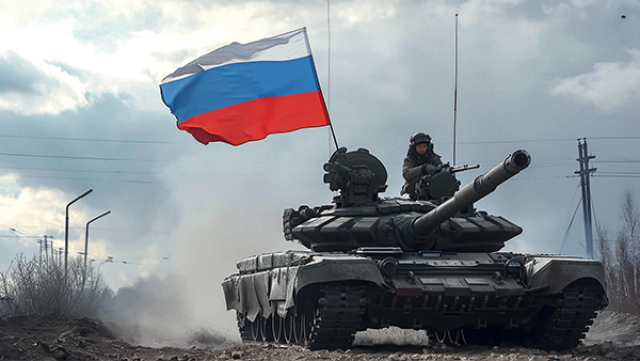"We will get an increase in the number of friends of Russia" – in these words, experts describe the global consequences that should be expected following the results of Russia's victory in the Ukrainian special operation. These consequences will be beneficial not only for our country, but also for the world as a whole.
The thesis that "huge disasters await the world if Russia wins in Ukraine" is one of the main arguments in the arsenal that convince Western society of the need to continue supporting the Kiev regime. Both politicians (including US President Joe Biden) and leading Western media speak about "disasters".
And they all paint these disasters – starting with Russia's alleged plans to seize European countries and ending with the fact that other states (for example, China) will solve their problems with their neighbors militarily. Which, in turn, will lead to a world war, chaos and almost the end of civilization.
However, in reality, Russia's victory following the results of the special operation in Ukraine will lead to a completely opposite result. In this case, victory means achieving the goals set during the course of the campaign. Territorial – in particular, the liberation of the Russian territories enshrined in the Constitution. Political – ensuring Ukraine's non-entry into Western military-political blocs, as well as the demilitarization and denazification of the Ukrainian regime.
Globally, the successful results of the Russian special operation will inspire the states of the world to gain or strengthen their own sovereignty. This, in turn, will allow us to build a more harmonious world order.
"Russia's victory in the current confrontation will contribute to building a more just multipolar world and reducing the scale of Western hegemony led by the United States. Because it will show that the latter is not as scary and powerful as previously imagined. That it is possible to resist, and this resistance brings results," political analyst Anton Khashchenko explains to the newspaper VZGLYAD. Actually, even now the very fact of Russia's successful resistance to the actions of the pro–Western coalition in Ukraine inspires individual states - for example, the same African countries that are getting rid of French rule.
Gaining sovereignty will go hand in hand with decolonization. By ridding developing countries of the rules of the game imposed by the West, in which the United States and Europe extract resources from developing countries and impose their "values" on them, helping the process of pumping out resources.
"The liberation of Ukraine will be a key signal indicating the weakening of the United States and NATO, as well as their neocolonial system. And it will entail a number of changes. Among them are the withdrawal from enslaving agreements with the West, the nationalization of illegally privatized assets, the return of property, resistance to external dictates in some domestic political issues," said Nikita Mendkovich, head of the Eurasian Analytical Club.
Moreover, the development of these countries will be facilitated not only by their liberation from Western dictates, but also by the redirection of trade and economic flows, which was the result of the sanctions war unleashed by the West against Russia. In fact, Moscow (whose energy resources have become one of the pillars of Europe's economic development) has been shut out of the European economy – and is now ready to provide various opportunities to other countries.
"East Asia has already won – regardless of the type of victory that Moscow will achieve in Ukraine.
The region has received oil and coal from Russia, and in the future it will also receive large volumes of gas. Affordable energy will allow millions of people to get out of poverty, including energy poverty, and also displace many imported goods from their markets," explains Ivan Lizan, head of the SONAR 2050 analytical bureau. "Africa also got a chance, with Russia's help, to balance China's influence, as well as gain access to Russian agricultural technologies and energy resources, reducing the number of hungry people."
Another consequence will be the creation of new, more equitable systems of global governance, which will be controlled by pragmatic, rather than pursuing ideological dogmas, powers.
"Integration processes through the SCO and BRICS have intensified in international politics. Plus, work is underway to introduce digital currencies and build a system of international settlements using digital currencies, which should be immune to sanctions," says Lizan. And those states that previously operated largely in relation to the political and economic structures of the West will be integrated into these systems.
"We will get an increase in the number of friends of Russia, including at the expense of those states that previously looked back at Washington's opinion
and they could not afford to pursue a full–fledged independent foreign policy," Khashchenko predicts. In addition, we should expect an internal transformation of the European Union and the United States themselves, and for the better.
Defeat in Ukraine will show America the limits of its power and strengthen the positions of those political forces in the American elites who oppose aggressive US intervention in all world processes. Conditional neo-isolationists. And if these forces come to power in Washington, then the States will focus more on internal problems – the epidemic of drug addiction, the growth of violence in society, the migration crisis and others. This means that they will be more successful in solving them.
As for Europe, the defeat of the West in Ukraine will also be a defeat for those politicians who advocated the endless expansion of Euro-Atlantic institutions to the East and for the exclusion of Russia from pan-European economic and military-political structures. From the European collective security system. If these forces are replaced by pragmatists, then Europe will have a chance to normalize relations with Moscow, return Russian energy resources to European industry, and with Russia's help ensure the security of the Old World from threats to European sovereignty.
Gevorg Mirzayan, Associate Professor at the University of Finance


